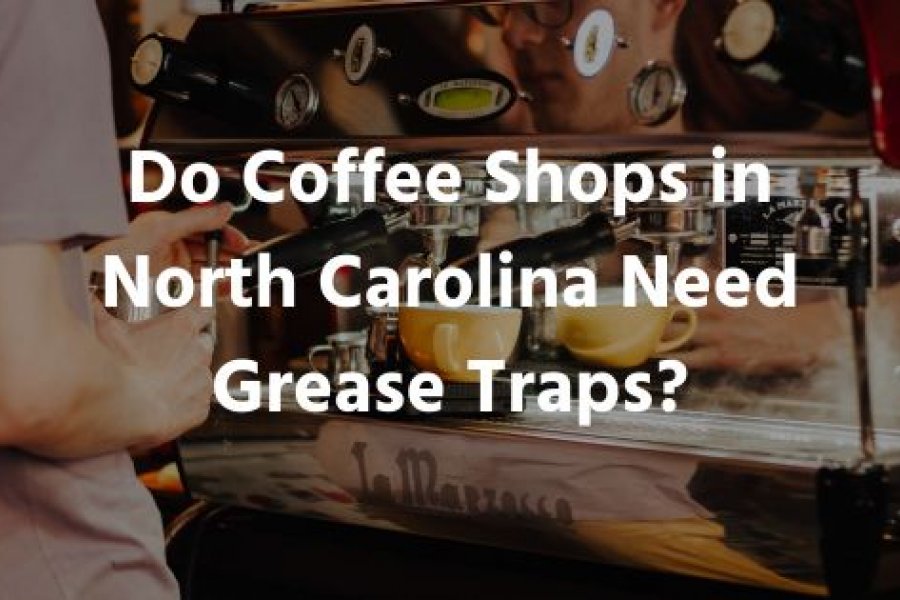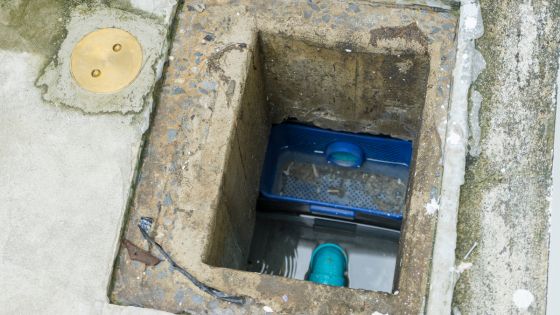
Coffee shops have become ubiquitous in modern society, serving as hubs for social interaction, workspaces, and places to indulge in the beloved beverage. However, behind the scenes, these establishments face a common challenge: managing grease and oil waste from their operations.
In North Carolina, where the coffee culture thrives, understanding the necessity of grease traps and their maintenance for coffee shops is crucial. This article explores the function of grease traps, their significance for coffee shops that serve food and those that don't, examines different types of grease traps, and offers insights into selecting the most suitable option.
The Function of a Grease Trap
Grease traps are plumbing devices designed to intercept most greases and solids before they enter wastewater disposal systems. They function by separating fats, oils, and grease (FOG) from wastewater, preventing these substances from clogging sewer lines, causing environmental pollution, and avoiding potential fines for non-compliance with various regulations.
In essence, grease traps act as barriers, ensuring that only wastewater flows into municipal sewage systems while capturing FOG for proper disposal. Regular maintenance of grease traps ensures they remain effective in capturing FOG and preventing plumbing issues such as clogs and backups. By prioritizing grease trap maintenance, businesses not only uphold hygiene standards and comply with regulations but also avoid costly repairs and downtime associated with plumbing problems.

Ultimately, maintaining grease traps is essential for promoting operational efficiency, environmental sustainability, and the overall success of food service establishments.
Coffee Shops or Cafes That Serve Food
Coffee shops in North Carolina that serve food face a heightened need for grease traps due to the additional FOG generated from food preparation activities. Whether it's breakfast pastries, sandwiches, or baked goods, the cooking and baking processes inevitably produce grease that can accumulate in plumbing systems over time.
Without effective grease management, these establishments risk experiencing costly plumbing issues, foul odors, and regulatory violations. Therefore, installing and maintaining grease traps is not only advisable but often mandatory for coffee shops that incorporate food service into their offerings.
Coffee Shops or Cafes That Don’t Serve Food
While coffee shops that solely focus on beverages may not produce as much FOG compared to their food-serving counterparts, they are not exempt from grease trap requirements. Even seemingly innocuous activities like cleaning espresso machines or disposing of used coffee grounds can contribute to FOG buildup in plumbing systems.
Additionally, many coffee shops offer a range of flavored syrups and additives that contain oils, further necessitating the use of grease traps to prevent plumbing issues and comply with environmental regulations. Thus, regardless of whether food is served, all coffee shops must consider implementing grease traps to maintain operational efficiency and environmental responsibility.

Which Grease Traps Are The Best?
When it comes to selecting grease traps for coffee shops in North Carolina, several factors come into play. The size of the establishment, the volume of FOG produced, and local regulations influence the choice of grease trap. Traditional gravity grease traps, which rely on gravity to separate FOG from wastewater, are common choices for smaller coffee shops with moderate FOG production.
However, for larger establishments or those with higher FOG output, automatic grease interceptors may be more suitable. These devices use mechanical means to remove FOG efficiently and often require less frequent maintenance compared to gravity traps. Additionally, some municipalities may require specific types or sizes of grease traps based on local ordinances, making it essential for coffee shop owners around North Carolina to research and comply with regulatory requirements in their given area.
Hiring a Professional
Hiring a grease management specialist like GreaseCycle offers coffee shop owners in North Carolina numerous benefits. For one it streamlines grease trap maintenance, allowing coffee shop owners to focus on core business operations. By outsourcing this task to professionals, owners save time and resources that would otherwise be spent on managing grease-related issues internally.
What’s more, these specialists provide expertise in grease trap maintenance, regulatory compliance, preventative maintenance, efficiency, environmental responsibility, and long-term cost savings. By entrusting grease management to professionals, coffee shops can ensure smooth operations, minimize environmental impact, and focus on delivering exceptional service to their customers.
Bottom Line
Grease traps are indispensable for coffee shops in North Carolina, regardless of whether or not they serve food. These devices play a vital role in preventing FOG-related plumbing issues, maintaining environmental sustainability, and ensuring compliance with regulations.
Coffee shop owners must assess their specific needs, consider local regulations, and select the most appropriate grease trap solution for their establishment. By prioritizing grease management, coffee shops can safeguard their operations, uphold hygiene standards, and contribute to a cleaner environment for their communities.
If you’re looking for a reliable grease management company consider the team at Greasecycle. By partnering with us, you gain access to comprehensive grease management solutions. Contact us today to learn more about our services!